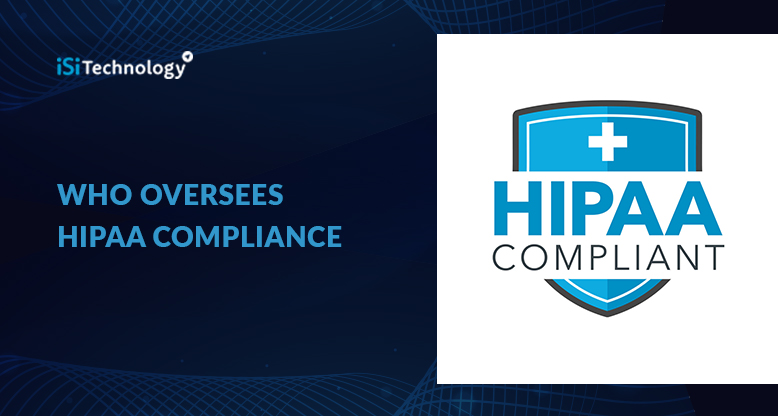Who Oversees HIPAA Compliance

Introduction
It is no secret that HIPAA compliance has become relatively more challenging. Oftentimes, there is even confusion between HIPAA certification and compliance. Fortunately, there are custom HIPAA software developments related to health tech.
HIPAA Basics
HIPAA regulatory requirements highlight the legal disclosure and utilization of PHI. In association with HHS, regulated HIPAA compliance is enforced via OCR.
If you’re wondering who oversees federal HIPAA compliance – it’s Office for Civil Rights (OCR). It is the chief enforcer in line with HIPAA compliance. However, it is up to the Office for Civil Rights to oversee HIPAA compliance requirements and determine if there is a need to impose a fine or penalty.
When it comes to upholding HIPAA compliance status for medical players, OCR plays a crucial role and guides healthcare providers. In fact, OCR helps healthcare players navigate how to deal with new changes and how they can trigger HIPAA violations.
From the perspective of healthcare organizations – there is a need to see HIPAA compliance as interconnected regulatory rules to create a standard. The idea is to safeguard the integrity, privacy, and value of health-related information.
As the burden of responsibility lies on the Human Rights office to oversee HIPAA compliance, folks also need to ensure they follow through with overall HIPAA requirements. Even when you focus on HIPAA and follow all the requirements – it often dawns on healthcare service providers about long their HIPAA compliance will last.
In layman’s terms, OCR, in association with the Humans Rights office, enforces and oversees regulatory HIPAA compliance. But this is only applicable if there is a direct impact on over 500 individuals. OCR also has the power to review small medical facilities and whether or not they’re HIPAA compliant.
Moreover, OCR is responsible for reviewing all the complaints about various healthcare organizations and find out whether or not they’re HIPAA compliant. Of course, OCR understands that full HIPAA compliance is impractical and shouldn’t be the goal for healthcare providers. Still, the department guides healthcare providers to be strategic and avoid all the possibilities of compromising valuable health information.
Who Coordinates and Oversees the Different Aspects of HIPAA Compliance in a Medical Office

On the surface, HIPAA compliance may come across as complicated. So, it makes sense why there are different bodies to oversee and ensure the implementation of HIPAA compliance requirements. When healthcare providers better understand who oversees and coordinates different areas of HIPAA compliance, it makes it easier for healthcare facilities to engage with the proper department.
And contrary to naive misconception, HIPAA enforcement can have a significant impact on medical bills. If there’s a complex compliance review of HIPAA, then legal attorneys help out to implement HIPAA compliance for people. Since HIPAA compliance is uniform for healthcare providers and individuals, it makes it easier to understand data retention standards and take the most informed decisions.
OCR and CMR Roles
When it comes to HIPAA enforcement and review, OCR and CMS are at the forefront and play vital roles. For instance, HIPAA directs the HHS secretary to align transactions across healthcare insurers and medical providers to address complex situations. And this, in turn, propels more industry players to adapt and maintain HIPAA-compliant status.
To communicate the right transaction codes, CMS enforces general guidelines. The idea is to have a continuous compliance review and impose corrective action. If there’s non-compliance and failure to meet general provisions of HIPAA, then responsible parties will have to face penalties. But even then, the department supports organizations that fail to meet HIPAA compliance requirements and need some help with technical elements.
HIPAA Noncompliance Penalties

There are penalties for noncompliance with HIPAA. A direct HIPAA violation triggers fines and penalties. So, it makes it all the more important for health industry players to pay close attention to HIPAA requirements. When it comes to HIPAA enforcement, OCR plays a central role.
Whether it’s unsecured or indirect violations, responsible parties have to inform OCR. In hindsight, OCR can perform HIPAA audits of random entities to determine whether or not they’re compliant. Healthcare providers can trigger HIPAA violations if health-related information is disclosed, used, or passed without meeting HIPAA regulatory rules.
In case of data breach or violation, it is imperative to notify HHS and individuals. If the HIPAA violation impacts over 500 individuals, it is also essential to inform a local media channel.
Remember, not every HIPAA violation leads to a fine. In fact, you’d be surprised to find out how many violations of HIPAA never even get reported. OCR has reviewed over 1 million cases, but only a little over 100 have been fined or settled.
Final Thoughts
HIPAA has become a hallmark standard to deploy and maintain health system solutions across the United States. In retrospect, HIPAA compliance ensures the safety and protection of healthcare service providers. Understand that HIPAA compliance requirements for insurance providers also apply to patients. The best course of action for healthcare facilities is to expand their understanding of HIPAA compliance requirements, adapt robust solutions, and determine whether or not they’re compliant.
In line with HIPAA compliance, ISI Technology works as a premier solution. You can avail our dedicated and custom software solutions that cater to medical transportation and medical billing industries. Book a free demo right now.